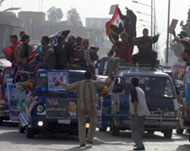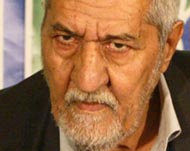Iraqi premier reaches out to Sunnis
The Iraqi prime minister has urged Sunni Arabs to join forces with Iraqi Shia in the new parliament after a landmark general election.

Ibrahim al-Jaafari said on Saturday: “To our brothers in Mosul, Ramadi and Tikrit, I say your brothers in Najaf, Karbala and Hilla have waited a long time to work hand in hand with you under the dome of the next parliament to build the new Iraq.”
Adnan al-Dulaimi of the Iraqi National Concord Front, a list strongly supported by Sunni Arabs, had said earlier that he was open to the idea of joining a coalition.
Al-Jaafari urged Sunni clerics to “use their position to spread principles of unity and freedom”.
Sunnis, who mostly boycotted a vote in January, flocked to polls on Thursday to elect a full-term parliament and boost their political representation.
The Iraqi prime minister similarly called on Baathists from the former ruling party to help rebuild Iraq.
 |
|
Supporters of the National |
Al-Jaafari is part of the United Iraqi Alliance (UIA), which is likely to again get a majority of votes in southern Shia areas.
The Independent Electoral Commission of Iraq has said official results will not be available before the end of the year, but unofficial estimates suggest polarised results similar to those from elections in January.
Early results questioned
Mahdi al-Hafidh, a former planning minister, told media in Baghdad: “The results that have been announced are incorrect and are meant to influence public opinion.”
He spoke after reports of a sweeping victory for the UIA in nine southern provinces.
“There were many violations in several provinces and there is widespread concern among the electorate, who feel state bodies and the electoral commission failed in their task,” said al-Hafidh, who ran for office alongside Iyad Allawi, a former prime minister.
Abdul Husain al-Hindawi, a senior commission member, ruled out new elections but said all official complaints would be looked into.
 |
|
Adnan al-Dulaimi said he was |
Al-Dulaimi appeared to accept the commission’s work and said: “We will work towards finding a strong coalition in the national assembly that can protect the rights of Iraqis.”
Al-Jaafari has said that if the UIA loses, which is unlikely, he will work with whoever wins “even if they are not qualified”.
The prime minister paid a visit on Saturday to Ali al-Sistani, the grand ayatollah and spiritual leader of Iraqi Shia.
Rallies
Shia and Sunni Arabs staged rallies throughout Iraq on Saturday to champion their legislative candidates as the country emerged from a three-day security lockdown.
The new 275-member parliament is to appoint a president and two vice-presidents. The presidential council will have 15 days to name a prime minister, who has 30 days to form a cabinet with parliamentary approval.
While few deaths occurred during the vote, instability in Iraq was underlined by a mortar attack on Friday that killed four children playing football and an Iraqi soldier near the western town of Haditha.
On Saturday, Shaikh Alaa al-Din al-Saadi, who follows Shia cleric Muqtada al-Sadr, was kidnapped at gunpoint in Baghdad’s sprawling Shia slum of Sadr City.